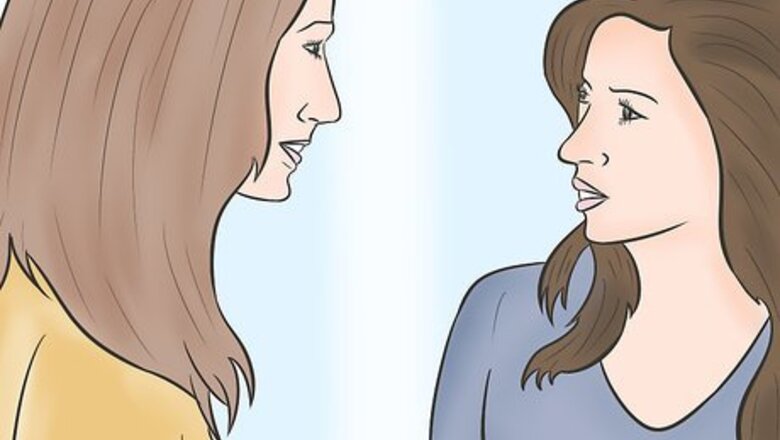
views
Casually Make Passive Weight Loss Suggestions
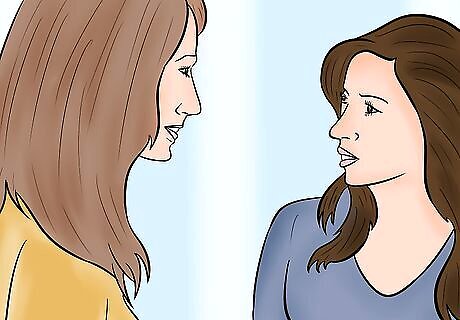
Assess your mate’s readiness for weight loss. If your friend is in denial about their weight problems, or if your mate is simply not interested in changing diet or exercise habits, more overt efforts on your part are unlikely to influence them to make a commitment to lose weight.

Suggest that your friend try a new diet or exercise program with you. Do research on healthy, balanced diet or exercise programs and ask if your friend will join you in trying to follow the new plan. Frame the discussion as if your mate will be the one helping you stick to a commitment to be healthier, instead of the other way around.

Ask whether your mate has considered losing weight. If you feel comfortable gently and directly addressing the matter, privately ask if they have thought about trying to lose weight. If your friend is already trying, offer your support and encouragement. If your mate is offended at the idea or sees no reason to lose weight, consider discussing your concerns about their health or drop the matter for a month or two to give the idea time to take hold in their head. Chances are, your mate is privately aware of their need to lose weight and is simply embarrassed to discuss the matter or to realize that someone else is concerned enough to mention it directly.
Talk About the Problems that Would Go Away If Your Mate Lost Weight

Demonstrate that individuals at a healthy weight experience less discrimination. Growing attention is being placed on the societal bias against heavy people by physicians, corporations, insurance agencies, the media, clothing stores, employers, potential and by current romantic partners. Achieving a healthy weight will make your mate more likely to receive less judgmental healthcare from a primary care provider, may reduce health insurance costs, may make them more appealing to hire or promotable, will make shopping for clothes more enjoyable, and will reduce your mate’s experience of social stigma attached to weight. Individuals at a healthier weight are more likely to have a satisfying love life. Those at a healthy weight are less likely to experience sexual dysfunction, and people of average weight are also more likely to rate their sexual health and satisfaction positively.

Show evidence that people at a healthier weight enjoy better mental health. Individuals at an average weight experience less depression, fewer eating disorders, and lower rates of other mental disorders. Showing your mate that healthier weight may equate to a happier life – less likely to include negative self-image and other stresses and worries associated with extra weight – may be the stimulus they need to work toward serious weight loss goals.
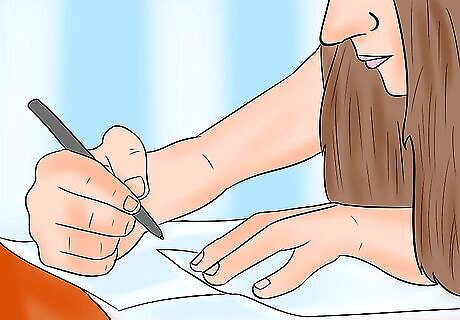
List serious physical consequences of being overweight or obese. Carrying a significant amount of excess weight contributes to multiple diseases. Even just a few extra pounds increases your mate’s risk of heart disease, certain types of cancer, diabetes, hypertension, sleep apnea, and high cholesterol, among other conditions. Excess weight may also inhibit recovery from certain illnesses and surgeries, prevent the provision of certain life-saving treatment or rescue services, and complicate the administration of effective medications and medical treatments. Women who are significantly overweight are also at increased risk of gestational diabetes, pregnancy complications and cesarean sections, birth defects in babies, and other maternal health complications.
Directly Confront the Issue of Health

Be honest about your concerns. If your mate is obese or considerably overweight, they are at risk of many health problems, such as cardiovascular disease, joint pain, and certain types of cancer. Have a private conversation in which you focus solely on your worries for their health, mentioning your concern for their well-being. Let your friend know that you do not want to see them go through any of the common problems that extra weight can cause. Express tenderness and let your mate know you are genuinely concerned that their weight will prevent the two of you from being able to fully enjoy life together (such as the birth of a child or grandchild of yours or getting to enjoy retirement or even a 40th birthday together).
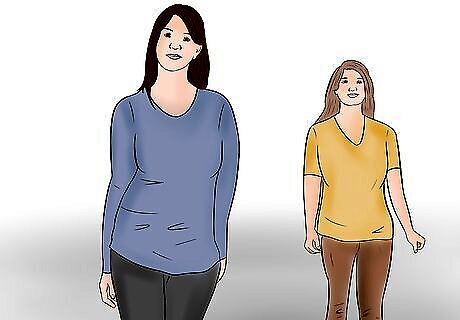
Focus discussions on health, not the number on the scale. Avoid focusing your comments on your friend’s weight, and instead emphasize the fact that you feel they are not healthy. Let your mate know that you care about them and would like to see them make a commitment to a healthy lifestyle. Pointing out difficulties your mate has controlling blood pressure or completing simple physical tasks without getting out of breath will show that you are genuinely concerned about health issues and not just a full figure. Consider making the conversation solely about the health issue, like working to reduce cholesterol, learning to better manage diabetes, or preventing a repeat heart attack. Addressing particular health problems through dietary changes or increased exercise may have the effect of improving health measures and dropping pounds without focusing your intervention on excess weight alone.
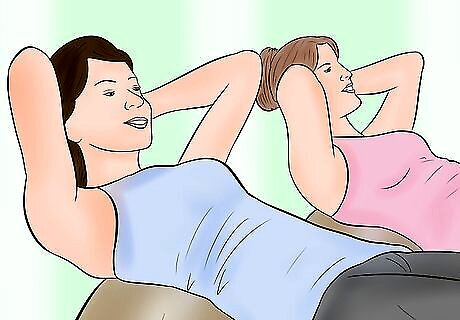
Make a commitment to a healthier lifestyle with your mate. Providing a good example and being a friendly companion may help your friend decide to adopt healthy changes. Even if you do not need to lose weight, you may be able to benefit significantly from adopting a healthier lifestyle. If you can personally commit to changing your diet (drinking less alcohol, eating less fast food, cooking more vegetables, etc), you can make a joint commitment to improving health with your mate. Encourage your friend to make a pact to improve health for both of you by joining a fitness club together, trying a new sport or physical game, taking a class on healthy cooking, or simply taking walks together every evening.
Focus on the Things You Could Do Together

Explain that you could spend more quality family time together if your mate lost weight. Losing weight could help your mate enjoy activities with your family that were previously unavailable to you due to the restrictions placed on an overweight individual. Amusement parks and water parks are safer and more accessible when a visitor is of a healthy weight. Playing Frisbee, taking 5K walks or runs as a family team, using the swing set, and chasing after young children are examples of family activities that are easier to perform when an individual is of average weight. Family-oriented events that require stamina or considerable time standing, such as cheering at a child’s daylong sporting event or volunteering at a school fair, will be easier and more pleasant for your mate to participate in once they have lost weight.

Talk about how traveling would become easier. Carrying excess weight can make travel more expensive and less comfortable. By losing weight, your mate can join family and friends in trips with less inconvenience and expense. Planes often have narrow passenger seats that make air travel uncomfortable for an overweight individual and the passengers traveling next to them. In some cases, significantly overweight passengers are required to purchase tickets for two seats so that they do not infringe on the space of neighboring passengers. Although this can quickly escalate travel costs and be an embarrassment to overweight individuals, this problem can be eliminated with even moderate weight loss in many cases. Travel often requires significant amounts of time walking, standing in line, carrying luggage, climbing steps, and touring on foot. Listing a few travel dreams of your mate and demonstrating how visiting these places would be easier without the strain of excess weight (and thus with increased mobility, stamina, and energy) may help goad them into attempting weight loss.

Make a “bucket list” of life-long dreams. Having a concrete list of things you and your mate wish to do together but cannot experience due to the discomfort or inconvenience of their excess weight may encourage your mate to drop the extra pounds. Think of all the places you would like to travel, the outdoor activities you would like to accomplish, the type of jobs your mate would like to achieve, and even the activities you would like to do together once they have a slimmer physique, and present the list of goals as more easily achievable with less excess weight. Climbing Mount Everest, walking a famous pilgrimage trail, being a model, looking great in a wedding gown or tux, and many other activities may fit well on the “bucket list” for your mate once they shed some weight.

Invite your mate to join a team or activity with you. Making a commitment to an activity that you can do together will reduce feelings of isolation in your mate and encourage them to lose weight in order to participate or may help them lose weight by virtue of participating. Playing on a rugby team, taking yoga classes, or joining a club of mothers who take regular walks together may help your mate focus on the enjoyable activities they could take part in once weight loss has been achieved (or in order to achieve it).
Understand What Encourages and Discourages Weight Loss Attempts
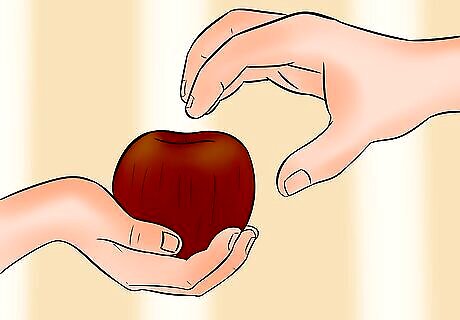
Be supportive and encouraging – within limits. If you obsess over your friend’s need to lose weight, you may drive them away. Let your mate know you are there to help in any way they need, whether it be just to listen or to give a 5am wake-up call every day.

Do not threaten your mate. If you are desperate for your friend to commit to losing weight, resist the temptation to threaten by using “or else” statements or making your friendship or affection contingent on their commitment to losing weight. Forcing your mate to choose between losing weight and having you as a supportive friend is unhelpful and may only drive your friend to poor eating habits or a sense of denial. If your friend has rejected your attempts to encourage weight loss, drop the issue for a while. Sometimes your friend needs to know that you support them despite any weight problems, and time may be the key ingredient in helping them develop the personal motivation to lose weight.

Offer positive reinforcement. When they make a healthy decision or reaches a goal toward committing to losing weight, celebrate with an activity that does not involve a focus on food or weight loss, like getting a manicure together, playing a game, going shopping, or simply offering positive compliments.
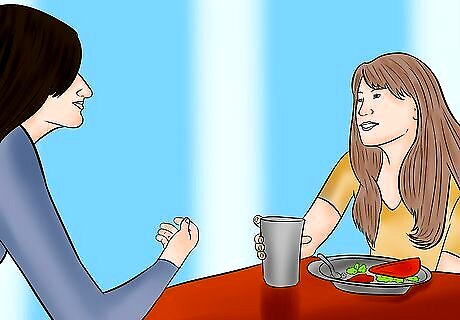
Do not criticize or be cruel. Insulting your friend in words or deeds, making derogatory comments about their size or eating habits, or excluding your friend from activities will not motivate them to lose weight safely and effectively. If you criticize your friend’s weight, clothing size, eating habits, physical activity levels, or appearance, you may inadvertently trigger unhealthy binging, eating disorders, and mental health problems while reducing your ability to influence them positively in the future. Do not lose your temper or turn the matter into an argument. Your mate will begin the process of losing weight when they are ready, and alienating yourself by speaking or acting offensively will endanger your friendship.

Remove roadblocks to weight loss. If your discussion about weight loss, health, and motivation has identified things that may be preventing your friend from taking the first step for weight loss, work to address the roadblock and help your friend find motivation. Some people just need regular reassurance that they are able to succeed at losing weight and that you will remain a friend no matter what the result. Others need a regular, firm reminder to exercise or eat well. If your friend does not know how to eat well or exercise, this may be the primary barrier between your mate and weight loss. Work with them to prepare healthy meals, take walks, learn how to lift weights, buy more vegetables instead of chips, and identify healthy substitutions for foods and activities. At times, the main barrier between individuals and a commitment to lose weight may be a mental or emotional difficulty. If your mate will not acknowledge a need to lose weight or get healthier, a doctor, loved one, or your friend alone may need to work through the matter without your interference.



















Comments
0 comment